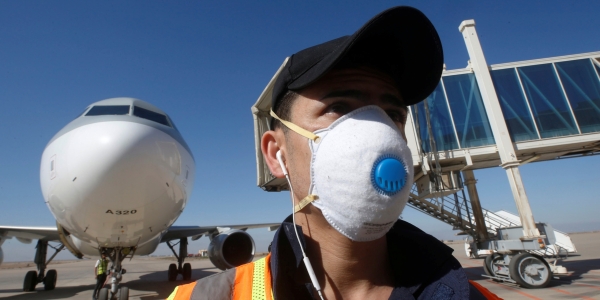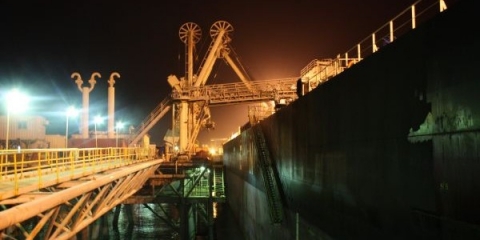Iraq’s oil sector takes new steps in coronavirus response
The Oil Ministry is determined to avoid any impact on production, but the oil sector is being disrupted by both reduced global demand and preventative health measures.
BASRA - Iraq's Oil Ministry has mandated shift reductions and cancelled group trainings as part of an effort to reduce the chance of the new coronavirus (COVID-19) from having an operational impact on the country's oil sector, which accounts for 90 percent of state revenue.
Iraqi state-owned and foreign oil companies are also taking further action, such as segregating their respective workforces, and officials have expressed optimism that even additional precautionary measures will not inhibit routine operation of the country's fields.
Oil fields in Basra and Dhi Qar provinces have been ordered to curtail production over the past four weeks, according officials at the state-run companies managing fields in those provinces. The reductions were cast as part of Iraq's efforts to adhere to OPEC production quotas, but the Oil Ministry also appears to be responding to reduced demand from Iraq's largest crude buyer, China.
There are increasing number of cases of COVID-19 in Iraq, though like many countries around the world, such as the United States, the quality and quantity of testing has been inadequate to get a full picture of the spread of the virus.
The Iraqi Ministry of Health on Tuesday told reporters that there have been 31 confirmed cases of COVID-19 in Iraq, all but one being Iraqi, and zero confirmed deaths. Globally, the World Health Organization on Tuesday said there have been nearly 91,000 cases and more than 3,000 deaths.
"In the past 24 hours, China reported 129 cases, the lowest number of cases since the 20th of January," Dr. Tedros Adhanom Ghebreyesus, WHO's director general, said in a briefing Tuesday. "Outside China, 1,848 cases were reported in 48 countries. Eighty percent of those cases are from just three countries: the Republic of Korea, the Islamic Republic of Iran, and Italy."
As the understanding of the virus has evolved, so has the Iraqi government's approach, according to interviews with more than a dozen government, oil sector, and health sector officials throughout the country. At first the Iraqi government responded primarily by restricting travelers from China and the movement of Chinese nationals within Iraq, there are now active measures to identify potential victims and contain them before they can spread the virus.
"At the beginning of the coronavirus outbreak, we as locals were kind of afraid of expats who were going to and out from China," said an Iraqi employee of a Chinese service company. "But the equation has changed: now they are afraid us, considering the fact that they are staying at the camp and they don't go to any busy areas, while we as locals usually move around the city, which increases the chance of us getting the virus."
Chinese and other foreign workers in Iraq's southern oil provinces remain confined to their camps at the field, allowing them to continue to work. To the extent foreign oil workers have been tested, there have been no COVID-19 cases confirmed among them.
Iraq Oil Report was shown a series of internal memos from the Oil Ministry and its state operating company affiliates that orders several measures to keep workers safe and oil fields operating.
This includes staff to be rotated every other week, in effect a 50 percent reduction of Basra Oil Company (BOC), Missan Oil Company (MOC), Dhi Qar Oil Company (DQOC), and North Oil Company (NOC) workers showing up to job sites. The most senior officials are exempted from this rule, and are empowered to exempt key lower-level personnel. Iraqi media reported that the Ministry of Electricity issued similar instructions on Sunday for non-essential staff nationwide.
A worker at the Rumaila field said Iraqi workers have been sent home for 20 days as a precautionary measure, although no infections have been documented among them.
"The company has made several precautionary and important preventative procedures, especially for Rumaila field, because it has the largest number of employees of BOC and BP foreign workers," said a senior BOC official.
Jobs essential to maintain production will remain fully staffed, according to the senior BOC official, as well as officials at Missan Oil Company (MOC), Dhi Qar Oil Company (DQOC) and South Gas Company (SGC).
The ministry has also canceled travel to certain high-risk countries, and those returning have been placed on a mandatory two-week leave, as are workers showing any symptoms. Training courses and gatherings, like non-essential large meetings and conferences, have been cancelled. Cleaning staff at ministry and company facilities are being ordered to increase their work schedule, however, and utilize specific disinfectants in high-traffic areas.
"Employees are urged to wear masks and gloves, to use disinfectants, and to stay away from crowded places," the Oil Ministry said in a statement Tuesday, attributed to Oil Minister Thamir Ghadhban, who is in effect handling many day-to-day government operations in the wake of Prime Minister Adil Abd al-Mahdi's quasi-resignation.
Ghadhban also called for a media blitz "to conduct an awareness campaign on preventative and precautionary procedures, which all must take to avoid the coronavirus spreading."
No oil field impact "at this time"
These steps, however necessary, could slow down oil sector operations.
"This will cause a lot of delays," said the Iraqi employee of a Chinese services company. "For example, negotiating or requesting from governmental oil offices will take more time now, as they will have fewer working employees, which will increase the delay, for example, when issuing a security clearance or a permit."
One internal memo of the BOC lists more than a dozen preventative measures to be taken, including "to separate BOC workers from the foreign staff as much as possible, and to maintain work progress via indirect contact, except for necessary situations," and "to evacuate unnecessary staff from the camps as soon as possible, except special cases that require staying."
The MOC is working with its two largest foreign oil company operators, the Chinese National Offshore Oil Corp. (CNOOC) and PetroChina, to sterilize facilities, check workers for symptoms such as fever, and keep them isolated in groups.
"PetroChina and CNOOC companies built two quarantine centers to isolate the suspected cases in the future, if they happen," said MOC media director Khalid Wahim. "If the virus spreads in the province, the investment companies might shut down their work in the company's fields. That's why the company's board had a meeting today and made instructions to prepare the national staff to manage the fields instead of the foreign effort, if that is required."
Wahim added there is "no production decrease at this time."
"Their presence or absence will not affect the workflow," said a senior DQOC official. "The fields will operate at full capacity."
Decreased demand
Over the past four weeks, however, at least four oil fields were ordered by the Oil Ministry to reduce production. Dhi Qar and Basra oil officials have said it was intended to maintain Iraq's compliance with commitments to OPEC, which for more than two years have been attempting to bolster oil prices by limiting supply.
Those actions contributed to rebounding prices, with Iraqi oil selling for more than $60 per barrel at the end of 2019 and beginning of 2020. But the COVID-19 outbreak in China in particular has reduced demand and pushed the Iraqi oil price toward $50 again.
"After the Basra storage depots were filled, especially after the coronavirus outbreak in China, which buys a large amount of Iraqi crude, this has reduced the Chinese oil tankers that arrive to Basra ports," said a senior DQOC official. "And since OPEC has decided to reduce production in Iraq, the Oil Ministry has given instructions to the Iraqi [state-run] oil companies to reduce production."
China remains a primary buyer of Iraq's crude exports, and reduced demand is inevitable, the employee of the Chinese service company said.
"Now China will require much less oil, as many companies, factories and refiners there have stopped working," he said.
The Gharraf oil field appears to have been the first to be curtailed, halved from its former output level of nearly 100,000 bpd, multiple DQOC officials said. Nassiriya oil field, also in Dhi Qar province, has also been reduced from 90,000 bpd to 60,000 bpd and remains at that rate, the officials said.
Over the past week, both the Rumaila and West Qurna-1 fields have been curtailed by 11 percent each, lasting four days, a senior BOC official said.
Iraq's contracts with foreign oil companies – Petronas operates Gharraf, BP operates Rumaila, ExxonMobil operates West Qurna-1 – include clauses that carry fees payable by the state if the ministry orders discretionary cuts below certain output volumes over set lengths of time.
Iraqi-operated oil fields are likely to be carrying the bulk of any curtailment, the senior BOC official said.
Commercial interruptions, too
Iraq appears to be facing a prolonged public health crisis, which will likely mean further disruptions to foreign travel and some commercial trade.
Border closures across Iraq to stem the flow of the virus are also affecting the movement of goods and people. On Feb. 29, the Ibrahim Khalil border crossing with Turkey was closed for passengers and cargo; border points with Iran are closed; and the Safwan border crossing with Kuwait has been closed since Feb. 24. The Trebil border crossing with Jordan is operating as normal but may still be closed in the coming weeks. Umm Qasr port in Basra is so far operating normally.
Turkish Airlines halted passenger flights to Iraq on Feb. 29 due to fears over the virus, with cargo flights continuing, pending a decision from the Turkish Ministry of Health.
Reacting to the Turkish government's decision to close Ibrahim Khalil border crossing, the Kurdistan Regional Government's (KRG) Interior Affairs Ministry issued a statement on March 1 that it has been trying to open the border point to maintain normal trade between the KRG and Turkey.
Trade quickly resumed at the KRG's border points with Iran and Turkey on March 1, after a brief closure, but civilian traffic is still prohibited.
"The Bashmakh crossing-point was completely closed for 24 hours last week but it's now open merely for commercial activities," said Shakhawan Abubakir, head of Customs Department at Bashmakh. "The KRG relies on goods that are coming across the border from Iran. Therefore, the borders with Iran had to be reopened."
Iraqis stranded in Iran will be allowed to return but will be quarantined, according to a senior official in Parwezkhan border crossing, who said that trade had resumed.
The KRG's Ministry of Health issued an urgent statement on Sunday morning calling on Kurdish citizens who had returned to Kurdistan through Munzariya border crossing without undergoing medical examinations to isolate themselves and contact a KRG medical team for a checkup.
Salam Asaadi, Head of the Medical Department at Munzariya border crossing, said the department received instructions to spray all Iranian trucks with disinfectant at the border, but his team lacked the equipped and people needed to do so.
"A group of businessmen who are affiliated with Badr forces have been putting pressure on us since yesterday, pushing for the resumption of commercial activities through Munzariya," Asaadi said. "The businessman purchased [the spray] on their own today and deployed it to the border."
The mayor of Khanaqin, Dler Saya, said his administration urged Diyala province to ban commercial traffic at Munzariya. "The Iranian truck drivers are mixing with Iraqi laborers, which could cause an outbreak of the virus if the drivers are infected," he said.
Ali al-Aqily and Jassim al-Jabiri reported from Basra. Jewdat al-Sai'di reported from Amara. Rawaz Tahir reported from Erbil. Mohammed Hussein reported from Sulaimaniya. Amir Ali reported from Kalar. Iraqi staff reporting from Kirkuk are anonymous for their security. Cathy Otten reported from the United Kingdom.





